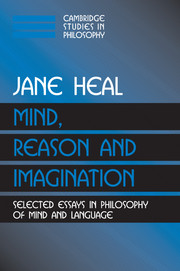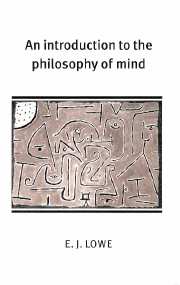Mind, Reason and Imagination
Recent philosophy of mind has had a mistaken conception of the nature of psychological concepts. It has assumed too much similarity between psychological judgments and those of natural science and has thus overlooked the fact that other people are not just objects whose thoughts we may try to predict and control but fellow creatures with whom we talk and co-operate. In this collection of essays, Jane Heal argues that central to our ability to arrive at views about others' thoughts is not knowledge of some theory of the mind but rather an ability to imagine alternative worlds and how things appear from another person's point of view. She then applies this view to questions of how we represent others' thoughts, the shape of psychological concepts, the nature of rationality and the possibility of first person authority. This book should appeal to students and professionals in philosophy of mind and language.
- A first-rate collection of essays by a prominent philosopher of language and mind
- Offers a distinctive view of simulation theory
- Challenges some widely held assumptions in philosophy of mind
Product details
December 2004Adobe eBook Reader
9780511054754
0 pages
0kg
1 b/w illus.
This ISBN is for an eBook version which is distributed on our behalf by a third party.
Table of Contents
- 1. Introduction
- Part I. Mind, Theory and Imagination:
- 2. Replication and functionalism
- 3. Understanding other minds from the inside
- 4. Simulation, theory and content
- 5. Simulation and cognitive penetrability
- Part II. Thought and Reason:
- 6. Co-cognition and off-line simulation
- 7. Semantic holism: still a good buy
- 8. Other minds, rationality and analogy
- Part III. Indexical Predicates and their Applications:
- 9. Indexical predicates and their uses
- 10. On speaking thus: the semantics of indirect discourse
- 11. Lagadonian kinds and psychological concepts
- Part IV. Thinking of Minds and Interacting with Persons:
- 12. What are psychological concepts for?
- 13. Moore's paradox: a Wittgensteinian approach
- 14. On first person authority.





